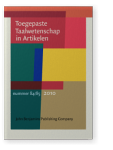Vol. 84/85 (2010) ► pp.135–144
De Interactie Tussen Leiding en Kinderen En Tussen Kinderen Onderling in Twee Verschillende Typen Buitenschoolse Opvang
In this paper we will show how different types of after-school day care (bso) influences discourse between caretakers and children. In field research carried out in the context of a PhD-study on the social development and discourse practices of young children in after-school day care, a continuum was found ranging from traditional bso's on the one hand to child-centered bso's on the other hand. In the more traditionally oriented bso's caretakers mainly take care of the children and try to instill proper behaviour in them. In the more child-centered bso's caretakers help children to discover the world by themselves. In this type of bso children learn to use exploratory talk in discourse with caretakers. In a first study of conflicts between peers it was observed that different arguments are being used by the peers.
Article language: Dutch
